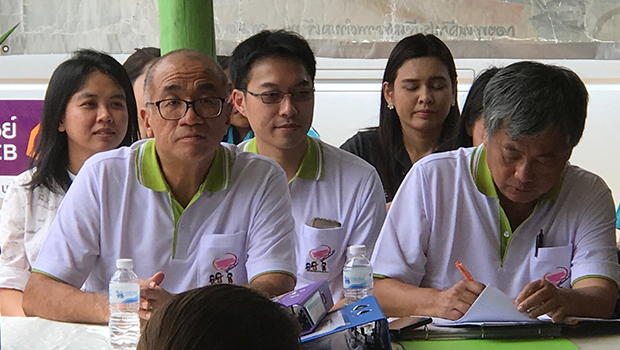
Prof Teh (in white, first from left sitting at the table) with Prof Soo Khee Chee, founding director of NCCS (in white, first from right) on a site visit to Khon Kaen, Thailand, to observe a CCA screening programme.
Meet Professor Teh Bin Tean, the professor who discovered that bile duct cancer in Asian and Western countries are fundamentally different. For this, he was invited to give a plenary lecture at the annual American Association for Cancer Research (AACR) Annual Meeting 2019.
Professor Teh Bin Tean, Deputy Medical Director (Research) of the National Cancer Centre Singapore and Professor in the Cancer & Stem Cell Biology programme in Duke-NUS Medical School, is on a quest: he wants to learn as much as he can about cancers in diverse geographic populations. Bile duct cancer, also known as Cholangiocarcinoma (CCA), is one of the cancers Prof Teh has chosen to focus his research on.
His reasons for doing so are close to heart: seeing his golf buddy and best friend’s wife struck down by this lethal cancer while still relatively young made him want to understand it better. Ten years on, he has travelled around the world, to countries such as Thailand, Taiwan, Korea, China, Brazil, Romania, and Italy to learn more about the cancer.
As an affirmation of his contribution, he was invited to give a plenary lecture on CCA at the American Association for Cancer Research (AACR) Annual Meeting 2019 in April – a prestigious conference where only world authorities in their fields are invited to speak at. He was also recently asked to contribute a commentary on the same topic in the influential journal, Nature Reviews Cancer.
“It was a great honour, but I also felt the pressure of speaking to thousands of the brightest minds in scientific research!” Prof Teh said with a laugh.
CCA: An Asian Cancer
Cancer is expected to affect more people in Asia, rising from approximately 6.1 million in 2008 to 10.6 million in 2030. Given this, more research is being done on cancers that are prevalent in the region.
CCA is one such cancer. It appears to be endemic in specific Asian countries like Thailand, Laos, and Cambodia, with notable rates in Taiwan, Korea and China; while remaining relatively uncommon in Western countries.
Prof Teh and his team have found that CCA in the different countries are not quite identical. They possess unique genotypes, which make them fundamentally different types of cancer.
Among people from the north-east of Thailand and its neighbouring countries, CCA is caused by chronic infection by a liver fluke called Opisthorchis viverrini, found in local fish which were consumed raw.
“However, CCA among people from Taiwan has shown links to the use of some traditional herbal medicines which contain aristolochic acid,” Prof Teh elaborated further, “while in the Western world and countries like Singapore, CCA is commonly associated with autoimmune diseases like primary sclerosing cholangitis, gallstones in the bile ducts, and congenital choledochal cysts that turn cancerous.”
Finding out that CCA is not just one cancer bodes well for patients, as treatment options may vary according to the type of CCA the patient has. “This knowledge will help us research and develop more targeted therapies – which will mean potentially better survival rates for patients,” explained Prof Teh.
AACR Team Science Award
In recognition of their works on Asian cancers, Prof Teh and his team also won the prestigious AACR Team Science Award in 2018, making it the first time an Asian team had won the award.
“Personally, the award has also felt like a validation of my 10 years of works in Asian prevalent cancers,” recalled Prof Teh with a smile. “This has spurred me on to push the envelope further as we move towards researching cures that will make a direct impact on patients’ lives.”
When asked about what keeps him motivated in this gargantuan task, Prof Teh said, with an excited sparkle in his eye, “As a scientist, I am curious about everything. I am always on the look-out for new things to tickle my curiosity, and always ready to break new ground.”













 Get it on Google Play
Get it on Google Play